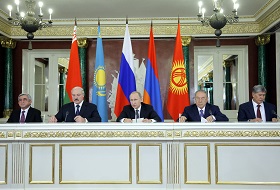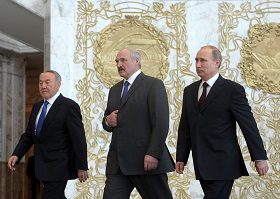Russia and Belarus: Forging Future Together
Vladimir Putin and Alexander Lukashenko
(no votes) |
(0 votes) |
Ph.D. in Political Science, Research Fellow at the Faculty of Political Science, Lomonosov Moscow State University
On December 14–15, 2015, the President of Belarus paid an official visit to Russia on. In their joint statement, Vladimir Putin and Alexander Lukashenko confirmed their commitment to further deepening of bilateral collaboration. The main challenge to address today is to adapt Russia–Belarus relations to the new international reality, which is dramatically different from the situation observed over the past two decades. The future of the Union State of Belarus and Russia will depend entirely on the ability of the two partners to work out a strategy to effectively address the challenge.
On December 14–15, 2015, the President of Belarus paid an official visit to Russia on. In their joint statement, Vladimir Putin and Alexander Lukashenko confirmed their commitment to further deepening of bilateral collaboration. The main challenge to address today is to adapt Russia–Belarus relations to the new international reality, which is dramatically different from the situation observed over the past two decades. Contemporary international relations are characterized primarily by growing uncertainty amid the unfolding crisis of the global order, which is unlikely to be resolved in the foreseeable future. The future of the Union State of Belarus and Russia will depend entirely on the ability of the two partners to work out a strategy to effectively address the challenge.
Strategic Interdependence
The Union State was established almost 20 years ago, and since its inception it has made significant progress in terms of military integration (the single task force and the air defence system were introduced) and military and technical cooperation, accompanied by the rapidly growing interdependence of the two economies. As of today, Russia accounts for around 45–50 per cent of Belarus’s foreign trade. While Russia mostly supplies raw materials to its western partner (which account for up to 90 per cent of the total trade volume, according to some estimates), Belarus supplies products with higher added value to Russia and the rest of the Eurasian Economic Union (EEU).
Following the negotiations in Moscow, Lukashenko called for Eurasian integration to be promoted further. He spoke about the plans to establish a single EEU market and develop industrial cooperation, as well as major infrastructure projects, the most important of which being the construction of the Belarusian nuclear power plant, a project financed using a $10 billion loan from Russia. Belarusian industrial companies will receive about half of this amount.
The project will enable Belarus to not only meet its domestic requirement, but also export electricity. More than 10,000 jobs will be created in the country’s hi-tech sector and related industries. We will see a qualitative change in the geo-economic role of Belarus in Eastern Europe. And this change will open up new opportunities for large-scale technological modernization, drawing on the potential of the Union State and the EEU market.
The achieved level of mutual understanding between Belarus and Russia is a result of both the historical and cultural foundation of Russia–Belarus relations, and the deeply intertwined strategic interests of the two countries at the present stage. Major pipelines connecting the Russian and European gas transport systems run through Belarus; military integration within the Union State ensures the defence of the western borders of the Collective Security Treaty Organization (CSTO); and millions of jobs in the two countries depend on bilateral economic cooperation and trade.
Security Comes First
The international crisis that originated in Ukraine and affected the entire Eastern European region further increased the interdependence of Russia and Belarus, calling for a new quality of bilateral integration. Russia is interested in maintaining reliable transport corridors that bypass Ukraine and go through Belarus. The expert community in Belarus expects the country to draw major benefits from China’s Silk Road Economic Belt project, as one of its spurs may cross Belarus. However, the reliance of the Belarusian administration on the role of the country as the “western gateway” of the EEU will only become relevant if it manages to ensure national security.
It should be noted in this context that the deployment of a Russian airbase in Belarus was not discussed in Moscow. Ahead of the presidential election in Belarus in October 2015, the Belarusian administration emphasized that the establishment of a Russian airbase in Belarus could threaten its relations with the West. In a later statement, however, Ambassador of the United States to the North Atlantic Treaty Organization (NATO) Douglas E. Lute said that an airbase would not alter the balance of forces in the region and posed no direct threat to the bloc.
We will see a qualitative change in the geo-economic role of Belarus in Eastern Europe.
Due to its lack of financial resources for modernization, Belarus was forced to decommission some of its military air fleet, a move that has weakened the air defence capacity of the CSTO on its western borders, especially given the increase in NATO’s military presence along the perimeter of Belarus and its plans to deploy a missile defence system in Poland in 2018. The unpredictable nature of the Ukrainian crisis also poses a real treat. In the context of the single air defence system of the Union State, these “gaps” can be filled by a Russian airbase, which will save Belarus costs and enable it to invest in its socioeconomic development.
The achieved level of mutual understanding between Belarus and Russia is a result deeply intertwined strategic interests of the two countries at the present stage.
Moscow respected Belarus’s unwillingness to explore possibilities for establishing a Russian airbase at the highest level, although a declarationwas made back in 2013 that the military departments of the two countries approved the move. Russia has enough instruments to ensure security on its western borders, making use of weapons systems exclusively in its own territory.
Amid the growing military presence of NATO in Eastern Europe, Moscow will have to further strengthen the western borders of the CSTO in order to prevent any dangerous imbalance of the military capabilities and deter potential escalation. Minsk, Moscow’s closest ally, needs to identify its position in this process.
A “Multi-Vector” Policy as Credo?

Nikolay Mezhevich:
Post-election Period in Belarus: Economy
Determines Politics
In the joint statement following their meeting in Moscow, the presidents of Russia and Belarus confirmed their commitment to the strategic priority of EEU integration with trade associations in the East and the West, including with the European Union. The strategic positions of Moscow and Minsk are similar; however, given the current foreign policy landscape, the approaches of the two allies are fundamentally different.
The Belarusian leadership regards the thaw in its relationship with the West as a step towards the “integration of integrations”. The Russian expert community broadly agrees that there will be no “integration of integrations” with the European Union in the foreseeable future, although strategically, the EEU is open to cooperation with partners both in the East and the West. The “integration of integrations” between the European Union and the EEU and the relationship between Belarus and the West are not synonymous, and there is no way they can be configured like a nested doll in the next few years.
The reliance of the Belarusian administration on the role of the country as the “western gateway” of the EEU will only become relevant if it manages to ensure national security.
The global crisis in Eastern Europe and the European Union’s orientation towards economic integration with the United States prevent Brussels from embarking on direct dialogue with the EEU, which was confirmed in a letter by Head of the European Commission Jean-Claude Juncker to President Putin. Although United States Secretary of State John Kerry made a statement that the United States has pretty much given up on its policy to isolate Russia, disagreements regarding security issues and risks of new crises remain relevant.
Brussels prefers negotiating with Minsk separately from the EEU, making use of the recent suspension of its sanctions against Minsk as one of the main instruments of pressure. This attitude obviously showcases the European Union’s unwillingness to build equitable relationships with Belarus and the EEU. A delegation of the U.S. Department of State, which visited Belarus in November, demanded that Minsk should make “positive steps” in response to the suspension of the sanctions. The American experts who visited Belarus have talked about the importance of Belarus shifting to a neutral military and political status, which de facto means Belarus’s withdrawal from the CSTO. In these conditions, it is important for Russia to have Belarus, its military and economic ally, pursue a predictable foreign policy.
Amid the growing military presence of NATO in Eastern Europe, Moscow will have to further strengthen the western borders of the CSTO.
The traditional argument of numerous western publications about Belarus potentially losing its sovereignty if it engages with Russia does not stand up to the basic facts. The “multi-vector” nature of Minsk’s foreign policy can been observed in the schedule of Belarus’s top officials. The day before Lukashenko came to Moscow, the Minister of Foreign Affairs of the Republic of Belarus Vladimir Makei held negotiations with EU foreign ministers in Brussels and addressed security issues with Deputy Secretary-General of NATO Alexander Vershbow.
The Neutrality Game

Ivan Timofeev, Elena Alekseenkova:
Eurasia in Russian Foreign Policy: Interests,
Opportunities and Constraints
The “multi-vector” policy and balancing between the West and Russia with respect to the Ukrainian crisis has enabled Minsk to turn certain threats into opportunities. Its neutrality on the Ukrainian issue allowed Belarus to provide a negotiating venue, especially given its geographic proximity to the epicentre of the crisis (as against, say, Astana). Minsk’s neutral position became a prerequisite for the West to start paying more attention to Belarus. The Russian food embargo allowed Belarusian producers to increase export deliveries of their food products to Russia. New opportunities emerged for Belarusian hi-tech companies to participate in the import-substitution programmes of the Russian military-industrial complex. Minsk has become an important link in trade and air travel between Russia and Ukraine.
The policy of balancing can only yield benefits when it is implemented within a clearly outlined framework. Such a policy allows a crisis of disappointed expectations, which largely caused the West to choose a confrontational model of engagement with the previous Ukrainian administration, to be avoided.
“Integration of integrations” between the European Union and the EEU and the relationship between Belarus and the West are not synonymous, and there is no way they can be configured like a nested doll in the next few years.
One of the key issues in the dialogue between Minsk and the West is the conditions for Belarus to borrow up to $3 billion from the International Monetary Fund (IMF), which are being negotiated now. Belarus already seems to have a “visual” of the target. However, Minsk’s attempts to raise the stakes in hopes of having political recognition and significant western investments sharply increase the risks of a new crisis in the relationship between Belarus and the West. The suspension of the sanctions is considered in the West to be a “down payment” that Minsk will have to work off by complying with strict political conditions.
The EU’s Old New Eastern Policy
By all appearances, the relations between the political centres in Big Eurasia will be built on the alignment of forces and interests, rather than on trust and openness, in the foreseeable future.
It is apparent today that the dreams of a common European home will never come true. By all appearances, the relations between the political centres in Big Eurasia will be built on the alignment of forces and interests, rather than on trust and openness, in the foreseeable future. As a result, tensions will grow, while predictability will be undermined. In the coming years, the engagement between Russia and the European Union will naturally continue, but with no hard rules and guarantees, let alone integration.
It will be possible to return to the idea of the “integration of integrations” once the process of actively restructuring the international order and the shifts in the correlation of forces in Europe slow down, giving way to the formation of a more balanced system. Under the circumstances, the best-case scenario is the establishment of mechanisms to deter and prevent risks, a sort of “de-conflicting” diplomacy.
It is important for Russia to have Belarus, its military and economic ally, pursue a predictable foreign policy.
If Brussels’ recently declared changes to its strategy on the European Neighbourhood Policy (ENP), namely, stabilization and differentiation (i.e. the use of tailor-made approaches with the Eastern Partnership member states), are implemented, there will be a real possibility to reduce tensions in Eastern Europe. At the same time, the analysis of the revamped ENP shows that Brussels has not reviewed the fundamental principles of its policy on Eastern Europe. The refusal of the European Commission to have a dialogue with the EEU indicates the preservation of the status quo in the European Union’s eastern policy, which could have been amended if the two blocs had started a real dialogue and if the European Union had altered the one-sided implementation of its eastern policy.
Moscow has made its position absolutely clear: any attempt at unilateral interference in the situation in the former Soviet Union will cause a most rigid response.
The latest OSCE expert group report, which has been prepared for the Ministerial Council in December 2015, confirms the fundamental differences in the positions of Russia and the West – no bridges will be built even at the expert level. The West regards Russia as a “revenge-seeking power” that must play according to existing rules. Russia assumes that over the past two decades Europe has de facto failed to follow any rules, given NATO’s eastward expansion and refusal of the West to engage in a dialogue on the establishment of a collective security system in Europe. These contradictions are perceived as systemic; therefore, even if the Ukrainian crisis is localized, no resolution of international contradictions will be likely in Europe in the foreseeable future.
In this framework, there are no clear guarantees that the West will not make more persistent (even though gradual) attempts to push Belarus towards neutrality. Moscow has made its position absolutely clear: any attempt at unilateral interference in the situation in the former Soviet Union will cause a most rigid response.
Priority of Predictability
The union of Russia and Belarus is evolving in a qualitatively different international situation compared with the previous decade. The change in the global balance of political and economic powers leads to the escalation of tensions and more heated confrontation between global powers.
The crisis in Eastern Europe is one of many indications of the accelerating realignment of the world, along with the volatile Middle East, the turbulent Chinese seas, and a vulnerable Central Asia. Against this background, the contours of new regional economic blocs become increasingly apparent, including the Trans-Pacific and Transatlantic trade partnerships. For that matter, those initiatives mean that cross-border trade barriers with countries that do not belong to these blocs will be removed.
In this context, Eurasian integration remains the only option for Russia and Belarus, despite a number of technical issues and disagreements. That bloc is the only way to eventually form a strong consolidated position in negotiations with other international associations and achieve equitable engagement. Plans for integration development within the EEU have been made for many years to come. These plans need to be thoroughly implemented, and foreign policy positions call for coordination. In these conditions, the most valuable “currency” in the Union relations is their predictability.
(no votes) |
(0 votes) |






